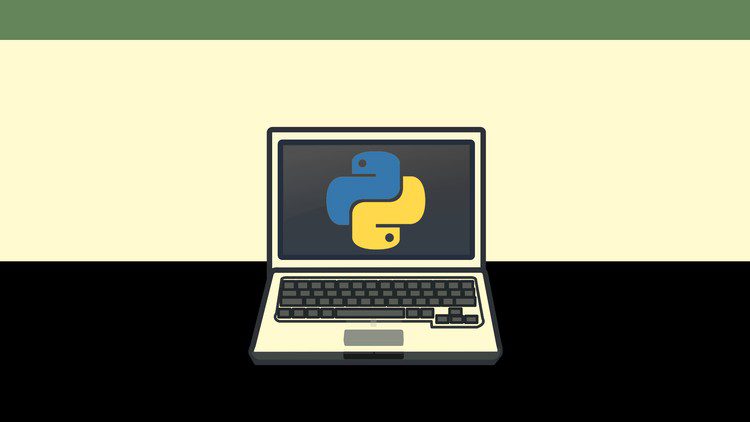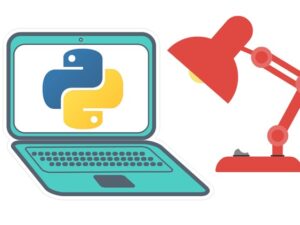Automatiser les tâches ennuyeuses avec la programmation Python
- Description
- Curriculum
- FAQ
- Reviews
Que vous soyez employé de bureau, étudiant, administrateur ou que vous souhaitiez simplement devenir plus productif avec votre ordinateur, la programmation vous permettra d'écrire du code pour automatiser des tâches fastidieuses. Ce cours fait suite au livre populaire (et gratuit !), Automate the Boring Stuff with Python.
Automate the Boring Stuff with Python a été écrit pour les personnes qui souhaitent écrire rapidement de petits programmes qui effectuent des tâches pratiques dès que possible. Vous n'avez pas besoin de connaître les algorithmes de tri ou la programmation orientée objet. Ce cours fait donc l'impasse sur l'informatique et se concentre sur l'écriture d'un code qui permet d'accomplir des tâches.
Ce cours s'adresse aux débutants complets et couvre le langage de programmation populaire Python. Vous apprendrez les concepts de base ainsi que :
- Récupération de données sur Internet
- Analyse des PDF et des feuilles de calcul Excel
- Automatiser le clavier et la souris
- Envoi de courriels et de textes
- Et plusieurs autres sujets pratiques
À la fin de ce cours, vous serez en mesure d'écrire du code qui non seulement augmentera considérablement votre productivité, mais aussi de faire figurer cette compétence amusante et créative sur votre CV.
-
1Get Python InstalledVideo lesson
This lecture explains what programming is good for, even if you don't intend to become a software engineer. At the end of this lecture, you'll be able to download and install Python and be ready to learn to code.
-
2Just a check in.Quiz
This quiz is here just to ensure you know about the website where you can find the Automate the Boring Stuff with Python book for free: https://automatetheboringstuff.com.
You don't need to purchase the book, and you can read it online if you want more information on the topics in this course.
-
3Basic Terminology and Using IDLEVideo lesson
The student will learn how to put values and operators together to form expressions, the most basic instruction type in Python.
-
4Writing Our First ProgramVideo lesson
Now that you've done some basic instructions in the interactive shell, let's use the file editor to write a complete program.
-
5Lecture 2 QuizQuiz
-
6Flow Charts and Basic Flow Control ConceptsVideo lesson
You've made Python execute instructions, now learn how to make Python choose which instructions to execute.
-
7If, Else, and Elif StatementsVideo lesson
The if/else statements are the basic instruction for letting your Python programs make decisions.
-
8While LoopsVideo lesson
Loops allow your program to execute the same code over and over again.
-
9For LoopsVideo lesson
The while loop will execute the same code over and over as long as some condition is true, but for loops allow you to execute a set number of iterations of a loop.
-
10Python's Built-In FunctionsVideo lesson
You don't have to write every bit of code yourself. Python comes with several functions that your program can call to leverage the code that others have written.
-
11Writing Your Own FunctionsVideo lesson
You aren't limited to the functions that come with Python. You can define your own functions using the def statement. Grouping code into functions helps make your programs shorter and easier to debug.
-
12Global and Local ScopesVideo lesson
Functions also introduce the concept of scopes. Learn the difference between global scope and local scopes for variables.
-
15The List Data TypeVideo lesson
Lists are values that themselves can contain multiple values. Learn how lists can expand your programs' capabilities.
-
16For Loops with Lists, Multiple Assignment, and Augmented OperatorsVideo lesson
There are several instructions that can be used with lists. This lecture introduces multiple assignment and revisits for loops.
-
17List MethodsVideo lesson
You don't have to write basic operations from scratch. Instead, learn about the methods that the list data type already comes with.
-
18Similarities Between Lists and StringsVideo lesson
Most of the things you've learned about lists also apply to strings. Two for one!
-
19The Dictionary Data TypeVideo lesson
Dictionaries also can contain multiple values. By using key-value pairs, you can begin to organize large amounts of data.
-
20Data StructuresVideo lesson
Dictionaries and lists can contain multiple values, including other dictionaries and lists. Combining them together you can organize your data into data structures.
-
21Advanced String SyntaxVideo lesson
There's much more to strings than concatenating and printing them. This lecture covers the other ways that strings can be represented in your Python code and why you would use these alternate forms.
-
22String MethodsVideo lesson
There are lots of useful and common things you'll want to do with strings, but you don't have to write the code to do them yourself. Python comes with string methods for many basic operations.
-
23String FormattingVideo lesson
String concatenation can become a mess of characters that makes your code hard to read. String formatting offers a simpler way to put strings together.
-
25Regular Expression BasicsVideo lesson
Regular expressions offer a way to not only search for text, but to search for patterns of text. This is a large step in increasing the power of your programs.
-
26Regex Groups and the Pipe CharacterVideo lesson
In this lesson, you learn how the pipe regex character allows you to search for one of multiple patterns.
-
27Repetition in Regex Patterns and Greedy/Nongreedy MatchingVideo lesson
In this lesson, you'll learn how to find repeating patterns and know the difference between regular expressions that do greedy-matching and nongreedy-matching.
-
28Regex Character Classes and the findall() MethodVideo lesson
While the familiar search() method returns the first match of the regex's pattern, the findall() method returns all matches of the pattern. This lesson also explores character classes: a handy shortcut for specifying alternatives in regex pattern.
-
29Regex Dot-Star and the Caret/Dollar CharactersVideo lesson
The regex dot-star is a common "catch all" pattern that you can use in your regular expressions. This lesson also explores matching patterns at the start or end of a string.
-
30Regex sub() Method and Verbose ModeVideo lesson
Regular expressions can not only find text patterns, but can also perform fin-and-replace for text patterns. The sub() method lets us make these text substitutions.
-
31Regex Example Program: A Phone and Email ScraperVideo lesson
At this point, we'll combine our knowledge of regular expressions to create a script that can pull phone numbers and email addresses out of a document.
-
32Filenames and Absolute/Relative File PathsVideo lesson
Files are stored in a hierarchical system of folders on your hard drive. In this lesson, you'll learn how to refer to specific files through absolute and relative file paths.
-
33Reading and Writing Plaintext FilesVideo lesson
Python lets you write out text to files and read text in from files. This allows you to have data from your programs persist even after they've shut down.
-
34Copying and Moving Files and FoldersVideo lesson
Python can copy, move, and rename files with your given criteria much faster than you could do this by dragging file icons in a File Explorer program. This lesson covers functions to perform basic file operations.
-
35Deleting FilesVideo lesson
Writing scripts to delete files can be a useful, but dangerous, feature to add to your programs. This lesson teaches you how you can keep bugs in your programs from causing any real damage.
-
36Walking a Directory TreeVideo lesson
"Walking a directory tree" is performing file operations not just on every file in a folder, but every file in every subfolder of that folder, and every subfolder of those subfolders, and so on. Normally this requires learning about recursion, but Python's os.walk() function makes this easy.
-
37The raise and assert StatementsVideo lesson
Assertions allow you to add "sanity checks" to your code. They won't fix bugs, but they will detect them early on and make the fix easier.
-
38LoggingVideo lesson
It's tempting to just add print() calls to help debug your programs, but Python's logging module offers a more powerful and convenient way to display debugging information.
-
39Using the DebuggerVideo lesson
All software developers eventually write bugs into their programs. The debugger is the main tool for finding and fixing bugs in every programmer's toolbox.
-
40The webbrowser ModuleVideo lesson
In this lesson, you'll learn about Python's webbrowser module. Although it's limited to opening up browser windows, this lesson explores how this can be used in a handy map script.
-
41Downloading from the Web with the Requests ModuleVideo lesson
Being on the computer often means being on the internet. In this lesson, you'll learn how to use the Requests module to download files from the web.
-
42Parsing HTML with the Beautiful Soup ModuleVideo lesson
While regular expressions are good for general text, the HTML-formatted text that make up the web pages your programs can download requires something more specific. The Beautiful Soup module has functions are locating information on a web page and extracting it for your programs.
-
43Controlling the Browser with the Selenium ModuleVideo lesson
The Selenium module provides the ultimate web scraping tool: it launches a browser that is controllable from your Python code.
-
44Reading Excel SpreadsheetsVideo lesson
Excel spreadsheets can be read just like any other file. In this lesson, you'll use the OpenPyXL module to extract data from spreadsheets.
-
45Editing Excel SpreadsheetsVideo lesson
This lesson continues with the OpenPyXL module to create or edit Excel spreadsheets.
-
46Reading and Editing PDFsVideo lesson
PDFs are a ubiquitous format for reports and business information. In this lesson you'll learn how to make your Python programs interact with PDF files.
-
47Reading and Editing Word DocumentsVideo lesson
Python can read and modify Word documents, including Word's styles and text-formatting features.
-
48Sending EmailsVideo lesson
Your Python scripts can automatically send out emails. This is a great for adding a notification feature to your programs so you can leave them running while you're away from your computer.
-
49Checking Your Email InboxVideo lesson
Python scripts can also log in to your email accounts for you to check your inbox and retrieve messages on your behalf.

Commencer
Académie

Les cookies sont de petits fichiers de données qu'un site Web envoie subrepticement à votre ordinateur, souvent sous la forme de fichiers texte ou de fichiers image. Les cookies nous permettent de stocker ou de récupérer des informations sur votre navigateur, qui pourraient être utilisées pour identifier qui vous êtes. Ces données sont généralement utilisées pour faire fonctionner le site comme vous l'attendez. Vous avez la possibilité de désactiver certains cookies car nous respectons votre vie privée. Pour en savoir plus et modifier vos paramètres, cliquez sur l'un des titres de catégorie ci-dessous. Le blocage de certains types de cookies, en revanche, peut sérieusement nuire à votre expérience sur le site et à l'accès aux services.
Ces cookies permettent au site Web de fournir des fonctionnalités et une personnalisation améliorées. Ils peuvent être définis par nous ou par des fournisseurs tiers dont nous avons ajouté les services à nos pages. Si vous n'autorisez pas ces cookies, certains ou tous ces services peuvent ne pas fonctionner correctement.
Les cookies que nous avons mis en place sur ce site pour vous permettre de partager notre contenu avec vos amis et vos réseaux sont à l'origine de l'existence de ces cookies. Ils peuvent suivre votre navigateur sur différents sites et créer un profil de vos intérêts. Cela peut influencer le matériel et les messages que vous voyez sur d'autres sites Web. Vous ne pourrez peut-être pas utiliser ou voir ces outils de partage si vous n'acceptez pas ces cookies.
Les cookies de partenaires publicitaires peuvent être utilisés sur notre site Web pour créer un profil de vos intérêts et afficher des publicités pertinentes sur d'autres sites Web. Ils ne collectent pas d'informations personnellement identifiables, bien qu'ils soient construits sur l'identification unique de votre navigateur et de votre appareil Internet. Vous recevrez des publicités moins ciblées si vous refusez ces cookies.
Ces cookies sont essentiels au fonctionnement du site Web et ne peuvent pas être désactivés dans nos systèmes. Ils ne sont généralement définis qu'en réponse à des actions que vous effectuez, ce qui équivaut à une demande de services, comme la définition de vos préférences de confidentialité, la connexion ou le remplissage de formulaires. Vous pouvez modifier les paramètres de votre navigateur pour bloquer ou vous alerter de ces cookies, mais certaines parties du site ne fonctionneront pas correctement si vous le faites. Ces cookies ne stockent aucune information permettant d'identifier personnellement quelqu'un.
Compter les visites et mesurer l'activité est essentiel pour maintenir un site Web performant. Ces cookies nous permettent de faire exactement cela en fournissant des informations sur les pages les plus/moins populaires, la façon dont les utilisateurs se déplacent sur le site, etc. Sans ces cookies, nous ne serions pas en mesure d'améliorer les performances de notre site.

Rejoignez notre cercle restreint et ne manquez jamais un battement
De nouveaux cours, de nouvelles informations et de nouvelles compétences ont le potentiel d'améliorer considérablement votre vie. Assurez-vous de ne rien manquer et informez-vous automatiquement.
* Nous détestons les spams et vous promettons de ne rien envoyer que vous ne vouliez pas. En vous inscrivant, vous acceptez nos politique de confidentialité.










